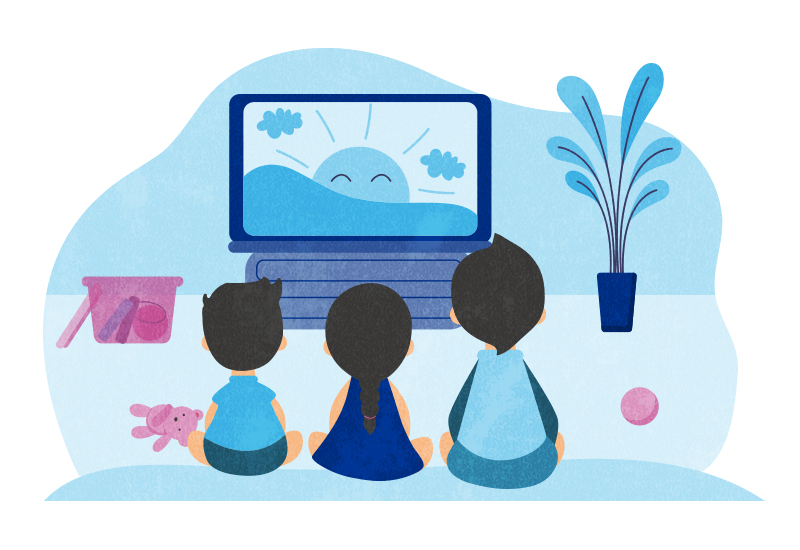A Quick Guide
The constant presence of electronic devices as parental figures is robbing parent-child relationships of quality time, leading to negative effects on children’s physical, cognitive, behavioral, social, and emotional development. Setting limits, monitoring content, and engaging in alternative activities are essential for supervising screen time and promoting healthy child development.
Electronic devices: The new parents
With screens being everywhere, it is reasonable to say that the current generation is partially being brought up by the devices acting as parental figures. Previously, children would go to their mothers to soothe themselves, now they turn to their gadgets for the same effect. Parents themselves are often guilty of handing over their phones to toddlers to get a sigh of relief. We can say that the constant presence of electronic devices in the background is robbing the parent-child of quality time. This is a serious point of concern as there are multiple types of research that document the negative effects of screen time on children.
Screen Time
The 21st century is described as the digital age. With the advent of electronic devices, the storage and accessibility of huge amounts of information in compact devices like mobile phones, computers, television, etc have become the norm. While this has revolutionized our lives through the provision of countless hours of entertainment, connectivity, and knowledge, it has also created a dependency on us. This has made life without these gadgets unimaginable. A new term ‘screen time’ is often incorrectly used to describe addiction to electronic devices. Whereas, the extent of dependence depends on how much the person regulates their screen time.
So the question is ‘What does screen time really mean?’.
Screen time refers to the time spent using an electronic device such as a computer, television, tablets, mobile phones or even a game console, for activities like watching a movie, surfing on social media, reading a book, playing games and so on.
Harmful effects of screen time on children
During early years when physical, social, and cognitive development is at its peak, over-exposure to screens can have negative short- and long-term consequences. Excessive and poor quality screen time can have the following negative effects according to a systematic review study:
- Physical issues: headaches, backache, obesity, vision problems, disturbed sleep cycle
- Cognitive issues: underdeveloped cognitive skills in younger children in cases of excessive passive screen viewing e.g. risk of language delay, poor attention span, less school readiness at the expected age. Screen time also hinders their sensory and physical engagement with the world and acts as an obstacle in their learning. Especially as young children learn the information better through live demonstration and physical engagement than by learning from a video.
- Behavioral disturbances e.g. violence, meltdowns, temper tantrums
- Underdeveloped social skills: poor facial recognition skills in young children and communication issues with others with increasing age
- Emotional issues: Emotional reactivity and aggression young in children. Along with depressive and anxiety symptoms in teens.
- 10% higher susceptibility for developing Attention Deficit/Hyperactivity Disorder (ADHD) in children
Signs of effects of screen time on children
Lookout for the following signs in your children which may indicate excessive screen time:
- Overstimulation: This includes behaviors of aggression, irritability, tantrums, meltdowns, hyperactivity, and emotional numbing in children. However, overexposure may not be the only cause behind such behaviors; other factors may also play a role and one should rule them out first.
- Physical signs: Children may have trouble making eye contact especially after using electronic devices. Sleep habits may also get disrupted e.g. being tired but unable to sleep. Other physical issues like headaches, body pains, and digestive issues may be associated with screen time when other causes are ruled out.
- Screens dominate social interaction: Children prefer screen time over face-to-face interaction with others. Older children sometimes even carry out most of their social activities (like necessary communication and interaction with peers) through a screen instead of face to face.
- Over-reaction to no screen time: When screen time is inaccessible, the child may react unfavorably and show tantrums, meltdowns, and not know what to do without their device, etc.
How much screen time is acceptable?
Parents need to lay certain ground rules for an acceptable range of exposure to screens. Following are some recommendations by the American Academy of Pediatrics (AAP):
- Limit screen time for children under 18 months of age to video calling with family only. Children learn by physically engaging with the world during this age, so introduce maximum activities to ensure that.
- Parents should monitor exposure to screens for children between the age of 18 to 24 and limit it to content that is useful for learning and brain development.
- Parents can allow one hour of supervised screen time every day for children aged between 2-5 years.
- Beyond age 6, parents need to implement a daily limit for screen time.
In the above cases, the parents need to ensure that screen time does not hinder the child’s physical activity, educational activities, and social activities. The quality of the content needs to be checked as well for educational and stimulating value for cognitive development. Parents should not completely deprive their children of screens as it can distance them from the family and create a gap between them and other children. Exposure to screens within an acceptable range is more appropriate.
Watch: [How much screen time is ok for young children?]
How to Supervise Screen Time for Children?

Despite the various educational benefits of exposure to screens, parents need to regulate and monitor their children’s screen time at all times. This is essential not only for effective parenting but to prevent the negative impact of overexposure to screens. Parents can supervise screen time for children by keeping the following guidelines in mind:
- Preview programs, videos, and games that children enjoy, for filtering out violent and indecent content.
- Teach your children about socially acceptable behavior of using the Internet. Discuss cyberbullying, maintaining privacy, and taking care to not leak personal information to strangers, along with possible implications of sharing embarrassing or problematic content online.
- Explain the workings of ads and how to respond to them to your children. Usage of an ad blocker is advisable in this case. Similarly, take measures to block dangerous and indecent websites.
- For young children, make screen exposure a structured activity by engaging the child with what they are viewing, helping them understand it, and applying it in life.
- Prioritize playtime without screens.
- Set certain parts of the day where screens are not allowed e.g. before going to sleep, during meal time, when guests are over while doing homework, etc.
- Set a daily schedule for screen time and penalties for going overboard
- Use apps to set screen time limits on your phones and television
- Keep screen time limited to the lounge and restricted in the child’s play area
- Limit background TV to a minimum
- Limit your own screen time to act as a model for your child
Alternative activities for Screen time
Parents can try the following activities with children instead of relying on gadgets:
- Family picnics
- Shopping trips
- Regular outdoor time; children’s packs, playgrounds, etc.
- Playing with toys
- Arranging playdates
- Mutually engaging activities like baking
- Reading picture books with them
- Helping them paint or doing arts and crafts
Exposure to screens has its educational benefits, offers leisure time to parents, is easy, and does not require active engagement. However, over-reliance on these gadgets to do the parenting will eventually affect the children’s development in the long run. To maintain the benefits and limit the harmful effects of screen time on children, parents need to step up and work to achieve this balance.



 Is exposure to media violence making your child aggressive?
Is exposure to media violence making your child aggressive?  Overexposure to Covid-19 Media and its Psychological Effects
Overexposure to Covid-19 Media and its Psychological Effects